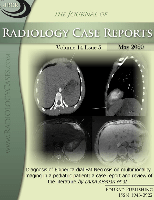
Journal of Radiology Case Reports
Scope & Guideline
Illuminating Radiology's Path with Open Access Case Reports
Introduction
Aims and Scopes
- Case Reports in Radiology:
The journal primarily publishes case reports that highlight unique or rare radiological findings, contributing to the body of knowledge in the field. - Interdisciplinary Approach:
It often involves collaboration across various medical disciplines, showcasing how radiological findings can impact patient management and treatment. - Educational Value:
By presenting detailed imaging findings and clinical correlations, the journal serves as an educational resource for radiologists and healthcare professionals. - Innovative Imaging Techniques:
The journal emphasizes the use of advanced imaging techniques and technologies, providing insights into their applications in clinical scenarios. - Pathological Correlation:
Many articles include pathological correlation, linking imaging findings to histopathological results, which aids in understanding disease processes.
Trending and Emerging
- Rare and Complex Cases:
There is a growing trend towards publishing reports on rare and complex cases that challenge standard diagnostic practices, providing valuable learning opportunities for radiologists. - Interventional Radiology:
An increase in case reports involving interventional radiology techniques highlights the growing importance of this field in patient management and treatment. - Pediatric Radiology:
There is a notable rise in case reports focusing on pediatric patients, emphasizing the unique challenges and considerations in imaging children. - Multimodal Imaging:
The journal is increasingly featuring case reports that utilize multimodal imaging techniques, such as combining MRI, CT, and PET scans, to enhance diagnostic accuracy. - Pathology-Linked Imaging:
Emerging themes include a focus on linking imaging findings with pathological outcomes, underlining the importance of correlating radiology with histopathology for comprehensive patient care.
Declining or Waning
- Generalized Imaging Techniques:
There has been a noticeable decrease in papers focusing on generalized imaging techniques without specific clinical context, indicating a preference for more unique or complex cases. - Common Conditions:
Reports on common conditions that are well-established in the literature, such as basic fractures or routine imaging findings, appear to be less frequent as the journal aims to provide more novel contributions. - Historical Reviews:
Case reports that primarily focus on historical reviews of previously documented cases are becoming less common, with a greater emphasis now on new findings and innovative approaches.
Similar Journals

Imaging
Connecting Researchers Through Open Access InsightsImaging, published by AKADEMIAI KIADO ZRT, is an esteemed open-access journal dedicated to the field of medical imaging, established in 2020. With an E-ISSN of 2732-0960 and based in Budapest, Hungary, this journal provides a vital platform for the dissemination of cutting-edge research and advancements in imaging techniques, especially in the realms of radiology, nuclear medicine, and ultrasound technology. While currently positioned in the Q4 category across multiple medical specialties, the journal continues to strive for improvements in visibility and impact, contributing to the evolving discourse in medical imaging. The journal aims to facilitate an inclusive and collaborative environment for researchers, professionals, and students, inviting them to share their findings and insights to enhance the field's development. With open-access availability since its inception, Imaging ensures free and easy access to its content, fostering a greater understanding and appreciation of innovative imaging practices worldwide.
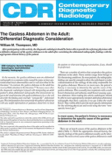
Contemporary Diagnostic Radiology
Innovative Insights in Diagnostic RadiologyContemporary Diagnostic Radiology is a pivotal journal in the field of medical imaging and radiology, published by Lippincott Williams & Wilkins. With an ISSN of 0149-9009 and an E-ISSN of 1938-1395, this journal serves as an essential platform for disseminating high-quality research and advances in diagnostic radiology and related disciplines. While it is categorized in the lower quartiles (Q4) for its performance in the 2023 rankings in both Neurology, Radiology, Nuclear Medicine and Imaging, and Surgery, its focus on emerging technologies and methodologies in imaging continues to provide valuable insights for practitioners and researchers alike. The journal’s scope includes innovative diagnostic tools, imaging techniques, and case studies, fostering collaboration and knowledge sharing in the medical community. Although it does not offer open access options, its commitment to contributing to the ongoing dialogue in clinical imaging is undisputed, making it an essential resource for professionals seeking to stay abreast of current trends and research in the rapidly evolving landscape of diagnostic radiology.
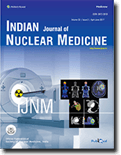
Indian Journal of Nuclear Medicine
Pioneering the Future of Nuclear ImagingIndian Journal of Nuclear Medicine, published by Wolters Kluwer Medknow Publications, serves as a crucial platform for advancing knowledge and research in the field of nuclear medicine, a specialized domain crucial for diagnostic imaging and therapy. With an ISSN of 0972-3919 and an E-ISSN of 0974-0244, this esteemed journal has been a trusted source of information from 2010 to 2024. Situated in Mumbai, India, it caters to researchers and professionals with an interest in the interplay between radiology and innovative nuclear imaging techniques. Although classified as Q4 in Radiology, Nuclear Medicine, and Imaging in 2023, the journal actively contributes to the dialogue surrounding emerging technologies, clinical practices, and challenges in nuclear medicine, making it a significant addition to the academic discourse. While currently not categorized as Open Access, readers can benefit from the wealth of peer-reviewed articles that shape the future of nuclear medicine and its applications. As the impact factor and specific H-index details are not listed, the journal's potential for future growth and increased visibility in the academic community remains promising, positioning it as a commendable resource for students, researchers, and healthcare professionals dedicated to the advancement of medical imaging and therapy.
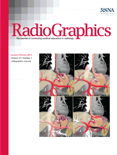
RADIOGRAPHICS
Empowering Radiologists with Cutting-edge ResearchRADIOGRAPHICS, published by the Radiological Society of North America (RSNA), is a premier academic journal dedicated to the field of radiology, nuclear medicine, and imaging. With an impressive impact factor and recognition in the top quartile (Q1) of both Medicine (miscellaneous) and Radiology, Nuclear Medicine and Imaging categories, RADIOGRAPHICS stands out as a leading platform for disseminating high-quality research and clinical findings. Since its inception in 1985 and projected to run until 2024, the journal has consistently provided essential insights into cutting-edge imaging techniques and advancements in radiological practices, making it invaluable for professionals, researchers, and students alike. Although it does not offer open access, the journal continues to flourish with a robust reputation, ranked 35th in its field according to Scopus, placing it within the 89th percentile of its category. With an unwavering commitment to enhancing the understanding and application of radiological sciences, RADIOGRAPHICS remains a pivotal resource for advancing knowledge and expertise within the medical community.
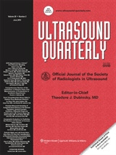
Ultrasound Quarterly
Exploring the Future of Ultrasound Technology.Ultrasound Quarterly is a leading journal published by Lippincott Williams & Wilkins, dedicated to advancing knowledge and practice in the fields of radiology, nuclear medicine, and imaging. Established in 1988, the journal has served as a vital platform for researchers, clinicians, and students seeking to stay abreast of the latest advancements and techniques in ultrasound technology. With an impact factor that reflects its significance in the field—ranking in the Q3 category within its specialty based on the 2023 metrics—this journal reaches a global audience, facilitating knowledge dissemination and fostering innovation. Ultrasound Quarterly publishes original research, reviews, and clinical studies, making it an essential resource for professionals committed to enhancing patient care through effective imaging practices. To explore its comprehensive articles, visit the journal's website for easy access to the latest research findings.
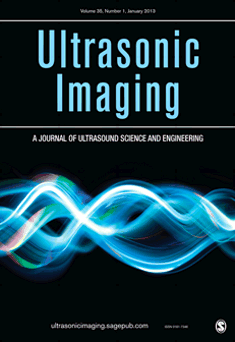
ULTRASONIC IMAGING
Shaping the Landscape of Medical Imaging with UltrasoundULTRASONIC IMAGING, published by SAGE PUBLICATIONS INC, is a leading journal within the fields of Radiology, Nuclear Medicine, and Imaging, with a particular focus on advancing the science and application of ultrasound technology. Since its inception in 1979, the journal has provided a platform for high-quality research, featuring innovative studies that bridge theoretical advancements and practical applications, making it an essential resource for researchers and professionals. With a notable impact factor reflecting its robust contribution to the medical community (2023: Q2 rankings in both Radiological and Ultrasound Technology and Radiology, Nuclear Medicine, and Imaging), ULTRASONIC IMAGING serves to disseminate pivotal developments in diagnostic imaging techniques, enhancing the understanding of ultrasound's role in patient care. Researchers are encouraged to explore this journal's collection of cutting-edge articles that push the boundaries of knowledge in ultrasound imaging and its implementation in clinical practices.
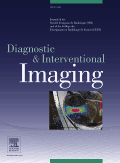
Diagnostic and Interventional Imaging
Leading the Way in Diagnostic and Interventional BreakthroughsDiagnostic and Interventional Imaging, published by Elsevier Masson, stands as a prominent journal in the fields of Radiology, Nuclear Medicine, and Imaging. With a significant impact factor and a reputation for high-quality research, this journal is dedicated to advancing the understanding and application of diagnostic and interventional imaging techniques. It has achieved an impressive Q1 ranking across multiple categories including Medicine (miscellaneous) and Radiological and Ultrasound Technology, demonstrating its esteemed position within the academic community. The journal features cutting-edge studies and reviews, reflecting the latest innovations and practices from 2012 to 2024. Researchers, healthcare professionals, and students alike can look forward to accessing valuable insights that drive forward the discipline and improve patient outcomes, as evidenced by its robust Scopus rankings placing it among the top journals in its domain.
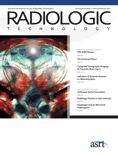
Radiologic Technology
Illuminating Advances in Radiologic TechnologyRadiologic Technology, published by the American Society of Radiologic Technologists, serves as a pillar in the fields of radiology, nuclear medicine, and imaging, providing critical insights and advancements that shape the practice and profession. With an ISSN of 0033-8397 and E-ISSN 1943-5657, this esteemed journal has been contributing to the scholarly literature since 1963 and continues its commitment to quality research well into 2024. Although it is not an open-access journal, Radiologic Technology is recognized for its robust contributions, holding a Q3 quartile ranking in both "Radiological and Ultrasound Technology" and "Radiology, Nuclear Medicine, and Imaging," according to the latest 2023 category quartiles. Its Scopus rankings highlight its standing within the field, offering thought-provoking articles that encourage further exploration and innovation. As the landscape of medical imaging evolves, this journal remains a crucial resource for researchers, practitioners, and students aiming to enhance their understanding of radiologic technologies and their applications in modern healthcare.
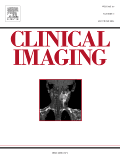
Clinical Imaging
Exploring New Frontiers in Clinical ImagingClinical Imaging, published by Elsevier Science Inc, is a renowned journal dedicated to the field of radiology, nuclear medicine, and imaging. With an ISSN of 0899-7071 and an E-ISSN of 1873-4499, this esteemed publication has established its significance in advancing imaging science since its inception in 1989 and continues to make impactful contributions to the discipline through 2024. The journal holds a prestigious Q2 ranking in the category of Radiology, Nuclear Medicine, and Imaging, reflecting its critical role in bridging research and clinical practice. Currently ranked #113 out of 333 by Scopus, with a notable 66th percentile, it offers a platform for disseminating high-quality research, reviews, and case studies that inspire innovation and enhance imaging techniques. Although it primarily functions as a subscription-based journal, it remains dedicated to accessibility and the dissemination of pivotal findings that inform both academia and clinical settings. Clinical Imaging is essential for researchers, professionals, and students alike, offering insights that shape the future of diagnostic imaging.

Hong Kong Journal of Radiology
Illuminating the Path of Radiological AdvancementsHong Kong Journal of Radiology, an esteemed publication of the Hong Kong Academy of Medicine Press, serves as a vital platform for disseminating innovative research in the field of radiology, nuclear medicine, and imaging. Established in 2011 and operating under an Open Access model since 2018, this journal not only promotes the sharing of knowledge but also enhances global accessibility to cutting-edge studies. With its ISSN 2223-6619 and E-ISSN 2307-4620, the journal strives to engage a diverse audience ranging from experienced professionals to aspiring scholars in the medical imaging domain. Despite its current ranking in the Q4 quartile of the Scopus category for radiology, the journal is committed to improving its standing by featuring high-quality research that addresses pressing issues in the field. The journal's convergence from 2011 to 2024 reflects its ongoing dedication to fostering academic excellence and encouraging collaborative discourse among researchers and practitioners globally. Located in Hong Kong, the journal plays a significant role in shaping the future of radiology education and practice in China and beyond.